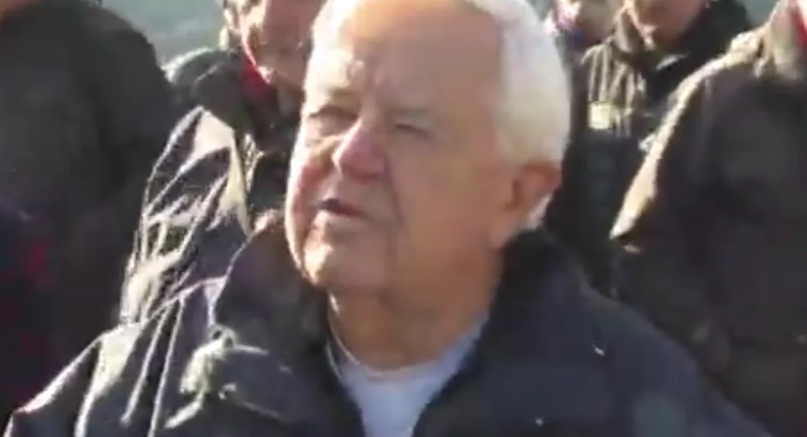On the occasion of the 83rd anniversary of the Battle of Dražgoše, several people gathered at Sunday’s ceremony in Dražgoše and were addressed by the Speaker of the National Assembly, Urška Klakočar Zupančič. She highlighted Dražgoše as a symbol of the resistance of a small nation against Nazi terror. However, the most notable moment from the event came from Milan Kučan, who made a veiled threat against a POP TV journalist.
Namely, Milan Kučan asked the Pop TV journalist “if she still had a job”. When she asked him why he would ask her such questions, he replied that today, things can change quickly, and added in Serbo-Croatian: “sad te ima, sad te nema”, meaning “one moment, you’re here, and the next, you’re not.” In response to the video that was published on X, Mitja Iršič wrote: “Can you imagine if Janez Janša had said that? Members of the Slovene Association of Journalists would have gone mad, and activists would practically be breaking their fingers, typing letters to Brussels about what horrible pressures are being exerted on journalists in Slovenia. But the penultimate President of the Communist Party can apparently say whatever he wants.”
This seems to be an open threat to the POP TV journalists who have been attacking “his” new face, Robert Golob, for the last few months – perhaps outside the script envisaged in the lairs of the deep state – before Kučan has had enough time to prepare a new candidate. In light of this, it is important to note that it was allegedly Golob’s faction that recently got rid of Tjaša Slokar Kos, who lost her job as editor-in-chief of the main news programme at POP TV. Has Kučan announced future purges? It seems that journalists are just resigned to their fate and do not even dare to write about the fact that the penultimate President of the Communist Party threatened them with dismissal.
Klakočar Župančič was in a “revolutionary” mood
Criminal regimes are regimes of cowards whose fear of anything different drives them to commit crimes against humanity and acts of genocide, according to the Speaker of the National Assembly, Urška Klakočar Zupančič. In her speech, she pointed out that, 80 years after the end of the Second World War, they are happening again, not too far from us, according to Slovenian Press Agency (Slovenska tiskovna agencija – STA) reports.
She also touched on what is happening in Slovenia. The President of the Associations of the National Liberation Movement of Slovenia (ZZB NOB), Marijan Križman, then addressed those gathered at Dražgoše. The ceremony was once again attended by some of the government representatives, and many people walked to Dražgoše.
A communist fairy tale to preserve positions and privileges
Let us remind you that the purpose of the celebrations in Dražgoše is primarily for those gathered there to fraternise with “their own” and that the celebrations are based on mythology, not on the facts of the Second World War. Year after year, the provocations of the partisans, the shameful escape and the murdered civilians in Dražgoše are hailed as a heroic victory of the partisans over the German invaders, but in reality, the whole thing was a real tragedy. Before the war, Dražgoše had a population of about 400 people, only five of whom belonged to the secret communist circle. In 1941, the latter invited the partisans to spend the winter in Dražgoše. Most of the other inhabitants were not impressed by the “bullies with guns” and asked them to leave their peaceful village, fearing a German reaction to the fact that the Cankar Battalion was wintering there.
The Germans found out about the partisans wintering in Dražgoše, and the latter decided to “defend” the village against the Germans, who had come there solely for the partisans. On the very first day of the shelling of the village, most of the partisans fled to Jelovica, leaving the civilian population at the mercy of the German invaders. If the partisans had withdrawn from Dražgoše in time, without making the situation worse in the meantime, the village would not have suffered the losses it did as a result of the partisan gamesmanship. The Germans killed 41 inhabitants and transported 80 of them to Ljubljana. Eight partisans and 27 Germans were killed in the battle. Meanwhile, with the help of Party propaganda, the number of fallen German soldiers was increased until the number rose to several hundred. After the battle, Dražgoše was razed to the ground – all the houses, including the village church, were mined and demolished completely.
Domen Mezeg


